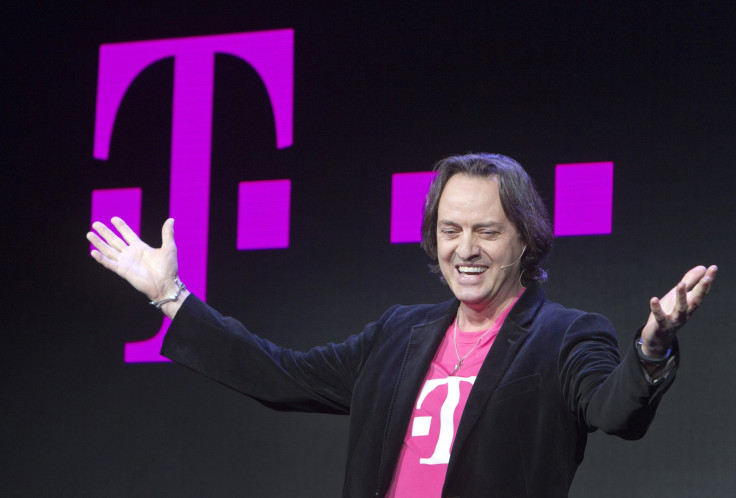T-Mobile CEO John Legere Challenges FTC To Go After The ‘Real Bad Actors’

John Legere, the mercurial CEO of T-Mobile US Inc. (NYSE:TMUS), has come forward following allegations by the Federal Trade Commission (FTC) that the mobile network was profiting from unauthorized charges that were being added to customers’ wireless phone bills.
The FTC filed a complaint against T-Mobile on Tuesday, accusing the carrier of a practice called “cramming.” According to the FTC, T-Mobile was charging customers up to $9.99 per month for some sort of premium text message service from third-party companies that delivered horoscopes and celebrity gossip to mobile devices. T-Mobile reportedly profited from 35 percent to 40 percent of the amount charged, a total the FTC says is in the millions.
However, Legere also released a statement on Tuesday, calling the FTC’s accusations “misdirected.” He noted that the practice in question is something T-Mobile halted last year as the carrier transitioned from its former business model to its new “Un-carrier” model. Legere says T-Mobile has been proactive in providing full refunds to customers that may have been unfairly charged.
“T-Mobile is fighting harder than any of the carriers to change the way the wireless industry operates and we are disappointed that the FTC has chosen to file this action against the most pro-consumer company in the industry rather than the real bad actors,” Legere said in a statement.
T-Mobile has positioned itself as a mobile network much different from its competitors. Since April 2013 the carrier has introduced six new services to its carrier model with intent on demonstrating its commitment to being as consumer-friendly as possible.
Legere notably made a splash at the recent press event for T-Mobile’s two newest services, Test Drive and Music Freedom, where he accused competitor networks of doing anything to benefit the bottom line with no regard for their subscribers.
“These are high-and-mighty duopolists that are raping you for every penny you have,” he said. “The f---ers hate you.”
Though Legere insists that T-Mobile has made efforts to fully refund customers affected by cramming, the FTC says the carrier actually has not been as compliant as its claims. According to the FTC, its primary charge against T-Mobile is that the carrier was not refunding customers in full. Many customers reportedly received only partial refunds for two months of charges, while others were told by T-Mobile to seek refunds directly from the third-party content providers, but were not given accurate contact information for these companies.
"The FTC’s goal is to ensure that T-Mobile repays all its customers for these crammed charges," FTC Chairwoman Edith Ramirez said in a statement.
The FTC says it made efforts to reach a settlement with T-Mobile, a claim which Legere refuted via Twitter on Tuesday, stating that T-Mobile would have cooperated with the FTC had it been offered a settlement.
Part 1 New quote: "Commission officials said they had tried unsuccessfully to reach a settlement with T-Mobile"
- John Legere (@JohnLegere) July 2, 2014Part 2: if true then thin k why we wouldn't let 'em "settle" with us.you win then prize..And you can watch the DC circus that follows! Enjoy
- John Legere (@JohnLegere) July 2, 2014We have seen the complaint filed today by the FTC and find it to be unfounded and without merit. In fact T-Mobile stopped billing for these Premium SMS services last year and launched a proactive program to provide full refunds for any customer that feels that they were charged for something they did not want. T-Mobile is fighting harder than any of the carriers to change the way the wireless industry operates and we are disappointed that the FTC has chosen to file this action against the most pro-consumer company in the industry rather than the real bad actors.
As the Un-carrier, we believe that customers should only pay for what they want and what they sign up for. We exited this business late last year, and announced an aggressive program to take care of customers and we are disappointed that the FTC has instead chosen to file this sensationalized legal action. We are the first to take action for the consumer and I am calling for the entire industry to do the same.
This is about doing what is right for consumers and we put in place procedures to protect our customers from unauthorized charges. Unfortunately, not all of these third party providers acted responsibly—an issue the entire industry faced. We believe those providers should be held accountable, and the FTC’s lawsuit seeking to hold T-Mobile responsible for their acts is not only factually and legally unfounded, but also misdirected.
John Legere, CEO of T-Mobile USA
© Copyright IBTimes 2025. All rights reserved.





















